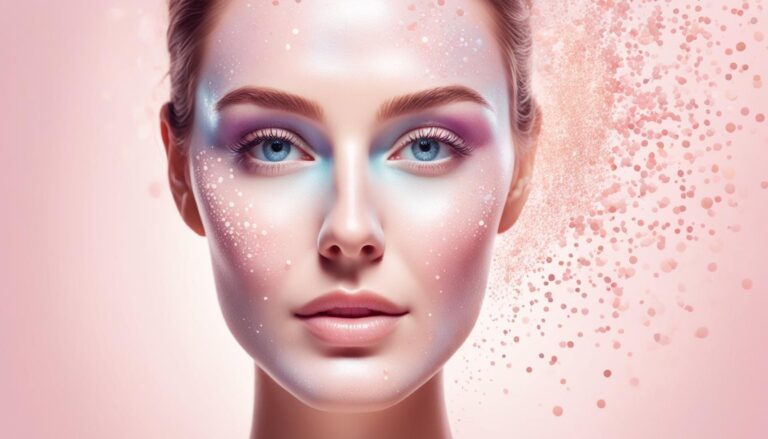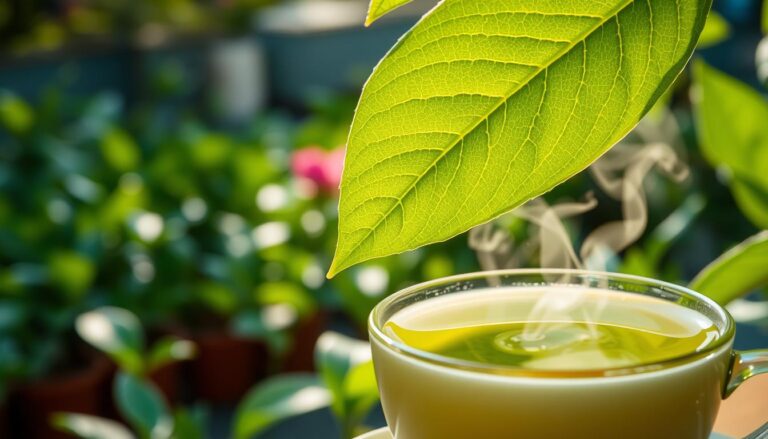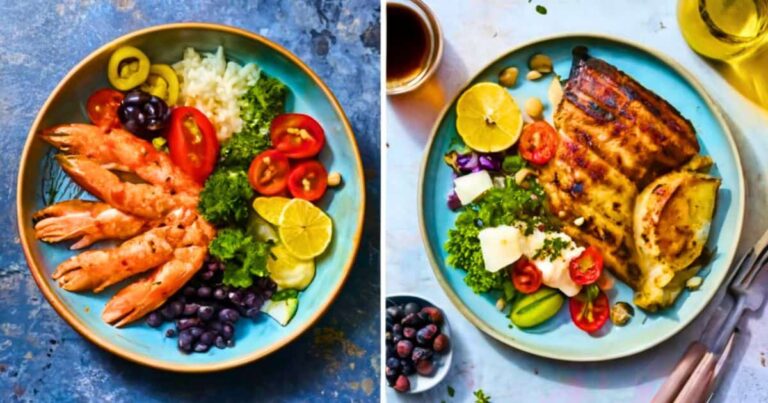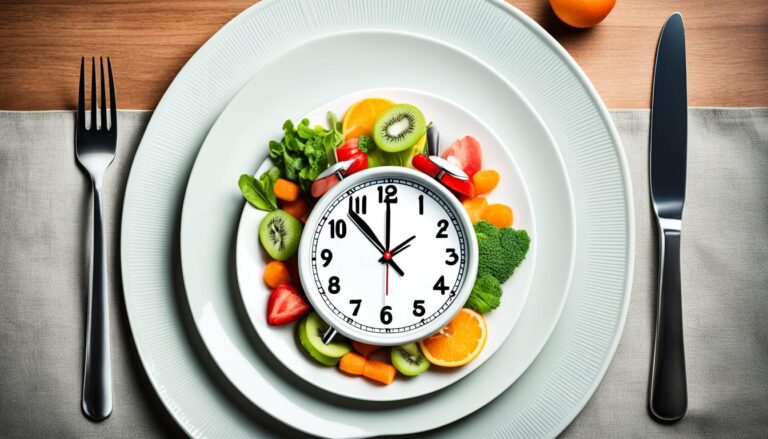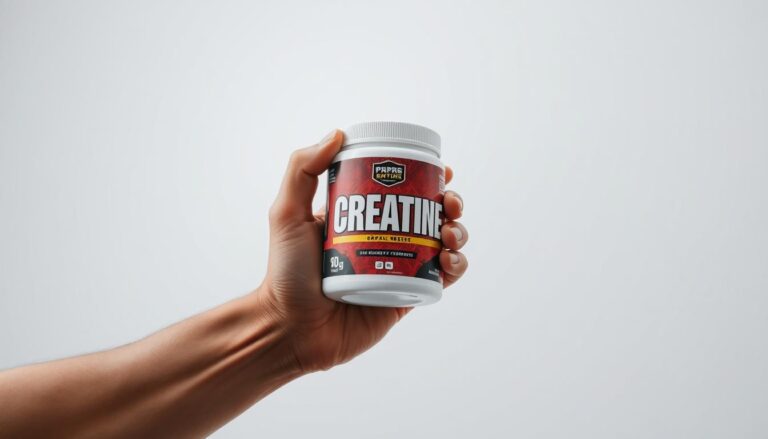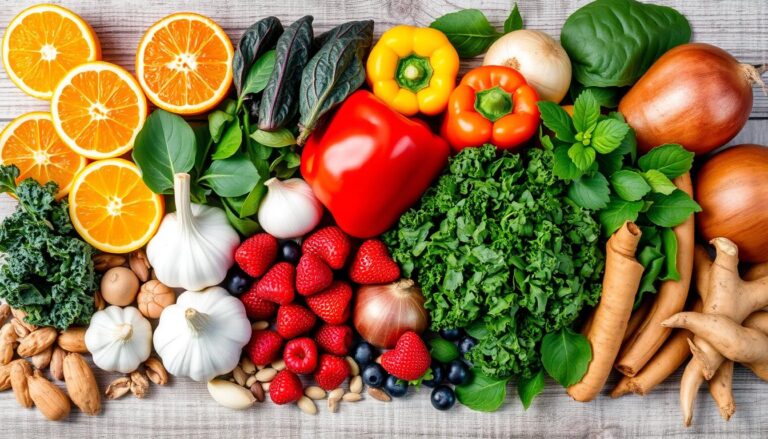When it comes to maintaining your overall health and well-being, there are certain nutrients that shouldn’t be overlooked. One such essential mineral is zinc. But just how much do you know about zinc and its role in your body?
Zinc plays a crucial role in various bodily processes, including immune function, wound healing, and DNA synthesis. It’s involved in over 300 enzymatic reactions, making it an indispensable mineral for optimal health.
If you’re curious about zinc and want to ensure you’re meeting your body’s requirements, you’re in the right place. In this article, we’ll explore the top 10 zinc-rich foods that you should include in your diet.
From meaty delights like red meat and poultry to nature’s bounty in the form of nuts, seeds, and legumes, we’ve got you covered.
So, are you ready to supercharge your diet with these zinc-rich powerhouses? Let’s dive in and discover the incredible benefits of including these foods in your daily meals.
Key Takeaways:
- Include zinc-rich foods in your diet for optimal health and well-being.
- Zinc is involved in immune function, wound healing, and DNA synthesis.
- The top 10 zinc-rich foods range from red meat and poultry to nuts, seeds, and legumes.
- By incorporating these foods into your diet, you can support immune function, promote wound healing, and achieve optimal health.
- Explore the profound health benefits of a zinc-rich diet and learn about zinc requirements for different life stages.
The Essential Role of Zinc in Your Health
Zinc is an incredible mineral that plays a vital role in maintaining your overall health and well-being. It is involved in the functions of over 300 enzymes in the body, making it essential for various bodily processes.
One of the key functions of zinc is its role in metabolizing nutrients. It helps your body break down carbohydrates, proteins, and fats, allowing for proper energy production and utilization. This is crucial for maintaining optimal bodily functions and supporting overall health.
In addition to metabolizing nutrients, zinc is also important for maintaining a healthy immune system.
It helps to strengthen your body’s defense mechanisms, making it easier for you to fend off illnesses and infections. By including zinc-rich foods in your diet, you can give your immune system the support it needs to keep you healthy and strong.
Zinc is also essential for the growth and repair of body tissues. It plays a crucial role in cell division and DNA synthesis, contributing to the development and maintenance of healthy skin, hair, and nails.
Fun fact: Did you know that zinc is commonly found in skincare products? Its ability to support skin health and repair makes it a popular ingredient in moisturizers, serums, and other beauty products.
Furthermore, zinc boasts antioxidant properties, helping to protect your cells from damage caused by harmful free radicals. This can aid in preserving your cellular health and reducing the risk of chronic diseases.
Overall, understanding the essential role of zinc in your health underscores the importance of including zinc-rich foods in your diet. By incorporating these nutrient-packed options into your meals, you can reap the countless benefits zinc has to offer and support your overall well-being.

10 Foods Rich in Zinc That You Should Eat
There are various foods that are rich in zinc and can be easily incorporated into your diet. These foods can be categorized into different groups, each offering unique sources of this essential mineral.
Meaty Delights: Red Meat and Poultry
In the meat group, red meat and poultry are excellent sources of zinc. Whether it’s a juicy steak or tender chicken, these protein-rich options not only satisfy your taste buds but also provide a good amount of zinc for your diet.
Sea Harvest: Oysters and Shellfish
If you’re a seafood lover, oysters and shellfish stand out in the seafood group for their high zinc content. These delicacies not only offer a unique flavor but also pack a punch of zinc to support your health.
Nature’s Bounty: Nuts, Seeds, and Legumes
For plant-based sources of zinc, you can turn to nuts, seeds, and legumes. These nutritious foods provide significant amounts of zinc and can be easily incorporated into your meals.
Add some almonds or pumpkin seeds to your morning smoothie or enjoy a hearty lentil soup for a boost of zinc.
Dairy Goodness: Milk and Cheese
Dairy products like milk and cheese offer a good amount of bioavailable zinc. Enjoy a glass of milk with your breakfast or indulge in a cheesy pasta dish to not only satisfy your cravings but also fulfill your zinc needs.
Plant Power: Vegetables and Grains
Lastly, vegetables and grains also contribute to your daily zinc intake. Incorporate spinach, broccoli, and quinoa into your meals to add a nutritious punch of zinc alongside other essential nutrients.
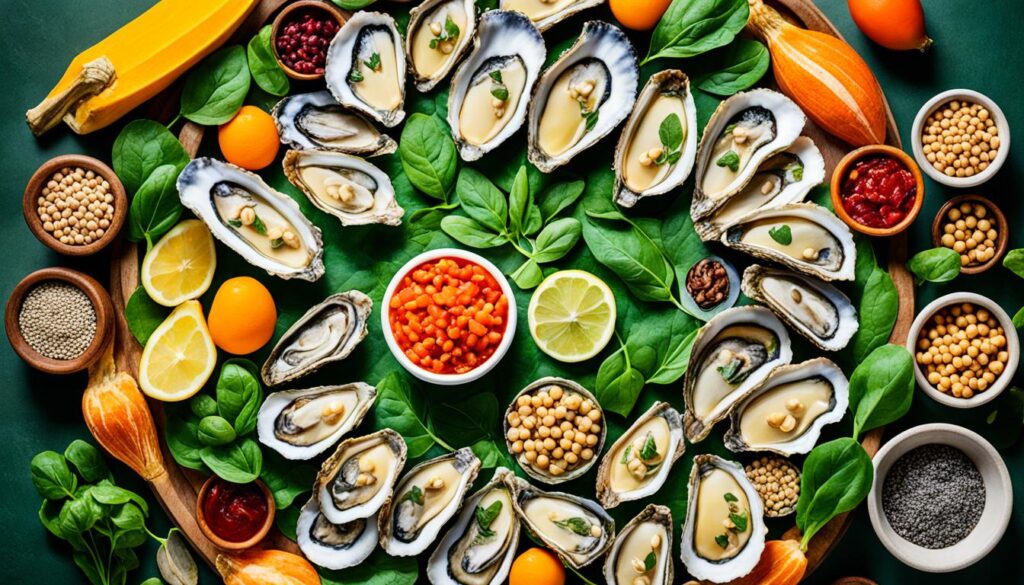
| Food Group | Top Zinc Foods |
|---|---|
| Meat | Red meat, Poultry |
| Seafood | Oysters, Shellfish |
| Plant-based | Nuts, Seeds, Legumes |
| Dairy | Milk, Cheese |
| Vegetables and Grains | Spinach, Broccoli, Quinoa |
Including these 10 foods in your diet will help ensure that you are getting an adequate amount of zinc. So go ahead and enjoy a variety of delicious meals while nourishing your body with this essential mineral.
Profound Health Benefits of Zinc-Rich Foods
Consuming a diet rich in zinc can have profound health benefits for your overall well-being. Zinc-rich foods offer a multitude of advantages, making them an essential addition to your daily meals. Let’s delve into the health benefits that a zinc-rich diet can provide:
1. Immune Function: Zinc-rich foods play a vital role in supporting a healthy immune system. By incorporating these foods into your diet, you can enhance your body’s defense against infections and reduce the severity and duration of illnesses like the common cold.
2. Wound Healing: Zinc is known for its wound-healing properties. Including zinc-rich foods in your diet can help speed up the healing process by promoting tissue repair and rebuilding damaged cells.
3. Age-Related Eye Damage: Zinc-rich foods have been found to contribute to the prevention and reduction of age-related eye damage. The antioxidant properties of zinc help protect the eyes from oxidative stress and maintain good vision.
4. Overall Skin Health: Zinc plays a crucial role in maintaining healthy skin. It supports collagen production, which is essential for maintaining skin elasticity, reducing the appearance of wrinkles, and promoting a youthful complexion.
5. Digestive Health: Zinc-rich foods aid in maintaining a healthy digestive system. Zinc plays a role in the production of stomach acid and enzymes necessary for proper digestion and nutrient absorption.
6. Reproductive Health: Zinc is essential for reproductive health in both men and women. It contributes to the production of hormones necessary for fertility and supports proper sperm production in men.
To experience these profound health benefits, incorporate a variety of zinc-rich foods into your diet. From oysters and nuts to red meat and legumes, there are numerous delicious options to choose from that will boost your zinc intake.

Zinc Requirements: How Much Do You Really Need?
It is important to understand the recommended daily intake of zinc to ensure that you are meeting your body’s requirements.
Zinc is an essential mineral that plays a crucial role in numerous bodily functions. From supporting immune function to promoting wound healing, zinc is involved in maintaining good health.
Recognizing the Signs of Zinc Deficiency
Recognizing the signs of zinc deficiency is essential in maintaining good health. Common symptoms of zinc deficiency include hair loss, impaired sense of taste and smell, delayed wound healing, and frequent infections.
If you suspect you may have a zinc deficiency, it is important to consult with a healthcare professional for proper diagnosis and guidance.
Zinc for Different Life Stages: Infants to Adults
Different life stages have varying zinc needs, from infants to adults. Infants require a higher amount of zinc to support growth and development, while pregnant and lactating women also need increased zinc intake to support the needs of their growing baby.
As we age, our zinc requirements may change, and it is important to ensure that we are meeting our body’s needs through diet or supplementation.
Special Considerations for Vegans and Vegetarians
Individuals following vegetarian or vegan diets need to be mindful of their zinc intake as plant-based sources may not be as easily absorbed as animal-based sources. Consuming zinc-rich vegetarian foods is essential for meeting zinc requirements and maintaining good health.
Plant-based sources of zinc include legumes, whole grains, nuts, and seeds. However, special considerations and strategies can be implemented for vegans and vegetarians to ensure adequate zinc consumption.
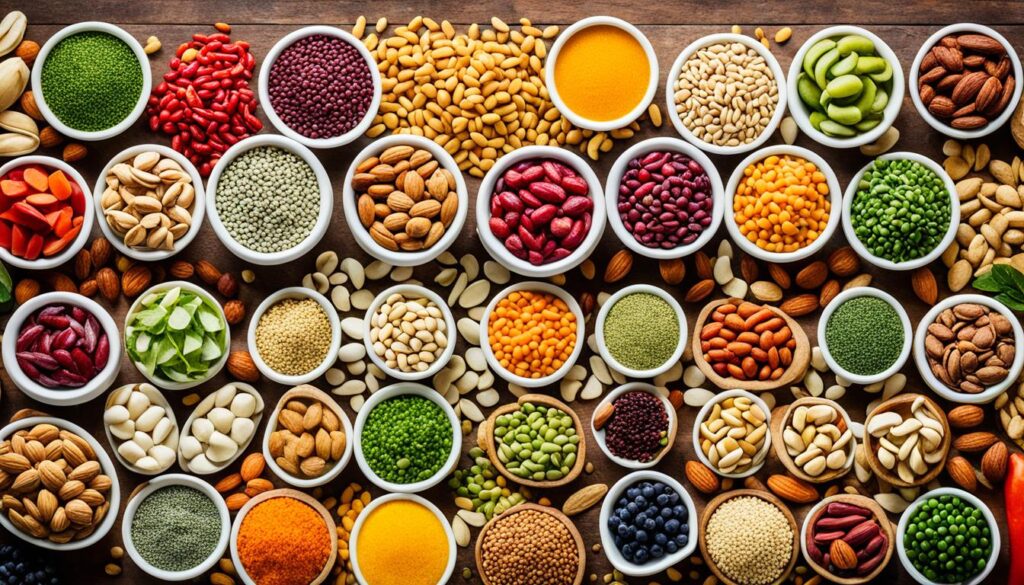
| Vegan and Vegetarian Zinc-Rich Foods | Zinc Content (per 100g) |
|---|---|
| Sesame Seeds | 7.8mg |
| Pumpkin Seeds | 7.64mg |
| Lentils | 3.3mg |
| Chickpeas | 3.43mg |
| Quinoa | 2.8mg |
| Brown Rice | 2.02mg |
| Cashews | 5.78mg |
| Almonds | 3.12mg |
| Walnuts | 2.57mg |
| Spinach | 0.53mg |
By incorporating these zinc-rich vegetarian foods into their diet, vegans and vegetarians can ensure they are meeting their zinc requirements and maintaining good health.
Conclusion
In conclusion, incorporating zinc-rich foods into your diet is essential for maintaining overall health and well-being. These top 10 foods rich in zinc not only provide numerous health benefits but are also easily accessible and enjoyable to incorporate into your meals.
By meeting your zinc requirements, you can support immune function, promote wound healing, and ensure healthy growth and development.
Whether you prefer animal-based sources such as red meat and poultry, or opt for plant-based alternatives like nuts, seeds, and legumes, prioritizing zinc-rich foods will contribute to an optimal diet that helps you achieve optimal health.
So why wait? Start incorporating these zinc-rich foods into your meals today and experience the profound impact they can have on your overall well-being. Your body will thank you for it!
